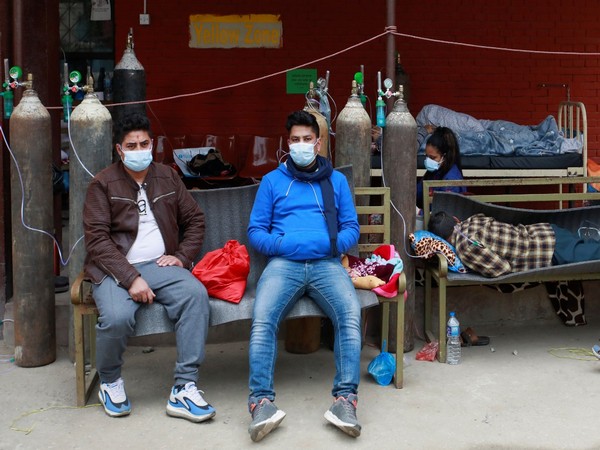Hospitals fill up as new mutant of Delta COVID-19 variant spreads in Nepal
The temporary shelter for COVID-19 infected patients at a hospital in Kathmandu has returned as a new mutant of the Delta COVID-19 variant is spreading in the Himalayan nation.

Kathmandu: The temporary shelter for COVID-19 infected patients at a hospital in Kathmandu has returned as a new mutant of the Delta COVID-19 variant is spreading in the Himalayan nation.
Beds have been set up in a tin cordoned structure with oxygen cylinders in Sukraraj Tropical and Infectious Disease Hospital amid the massive influx of COVID-19 patients.
In order to cope with the rising infection during the second wave, the hospital had extended its bed capacity by constructing a temporary shelter in its premises. As fear of the third wave is looming large, the hospital has once again has opened the shelter for patients.
"With the ease of prohibitory orders people have continued to flout safety measures. Upon being so, the number of cases is soaring high; the previous order has had played an important role in flattening the curve and now it is gradually surging up in the graph. Eventually, a number of patients in the hospital is constantly rising along with the number of infections," Dr Anup Bastola, Director at Sukraraj Tropical and Infectious Disease Hospital in capital Kathmandu told ANI.
As of Wednesday morning, 35 out of 100 general beds have been occupied by COVID-19 patients in Sukraraj Tropical Hospital. While 22 of its 28 ICU beds have been occupied.
Also Read |
Bubble Burst: New Zealand Suspends Quarantine-Free Travel With Australia
Similarly, the COVID unified hospital under the Bir Hospital has a capacity of 1000 general beds, out of which 100 beds is hosting patients. While 35 of its 100 ICU beds and four of 100 ventilators are now occupied by COVID-19 patients.
Teaching Hospital is also facing a similar situation as 95 of its 145 general, 11 of 33 ICU and 18 of 33 ventilator beds already have been filled with patients, ahead of the expected third wave.
Meanwhile, Patan Hospital and Armed Police Force (APF) Hospital, which also has been treating COVID-19 infected patients, is also witnessing a surge in the inflow of patients and beds have been filling up quickly.
As of Wednesday morning, 151 of 270 general beds in Patan Hospital and 161 of 200 general beds in APF Hospital have patients while 21 of 30 ICU beds in Patan hospital and 20 of 20 ICU beds in APF hospital have Coronavirus-infected patients.
10 of 15 ventilators in Patan hospital currently have patients with complexity while all 9 ventilators of APF Hospital have remained vacant along with 50 bedded HDU.
Also Read |
Sydney suffers worst pandemic day as lockdown nears six weeks
Nepal, till Wednesday morning, has recorded a total of 7,09,027 cases of SARS-CoV-2 infection after testing 3633118 samples since 2020. A total of 9,922 deaths has been reported so far which is more than casualties incurred due to the 2015 earthquake.
On Tuesday alone, the Himalayan Nation recorded 2448 new cases of infection while the recovery for the day stood at 1994 with 24 deaths. In recent weeks, a number of confirmed cases has continued to swell further setting up a record of the highest number of infections after the peak of second wave.
With local administrations around the nation relaxing the prohibitory provisions boosting mobility of people, the infection has further increased.
Experts have warned that the contagious delta variant which earlier had swept through the nation increasing infection and death toll is still spreading amongst the community.
"Highly contagious, Delta variant of the virus had invited the second wave. It brought the second wave of infection in Nepal, prohibitory orders imposed at that time, flattened the curve but the virus still is spreading inside the community and with the relaxation, people are rushing out from their homes which has further increased infection. We are on the verge of intensified cases of infection, a highly contagious virus is breeding amongst us. If we fail to adopt proper measures and follow rules then it would invite a catastrophe," Dr. Bastola warned.(ANI)
 Dynamite News
Dynamite News 